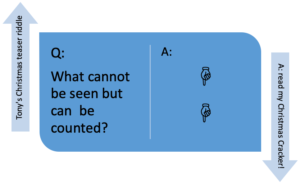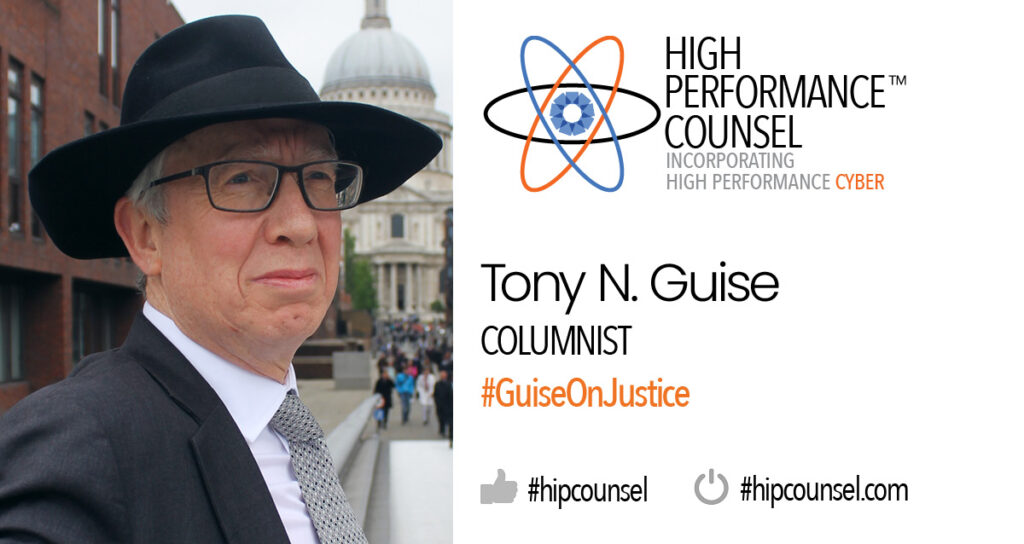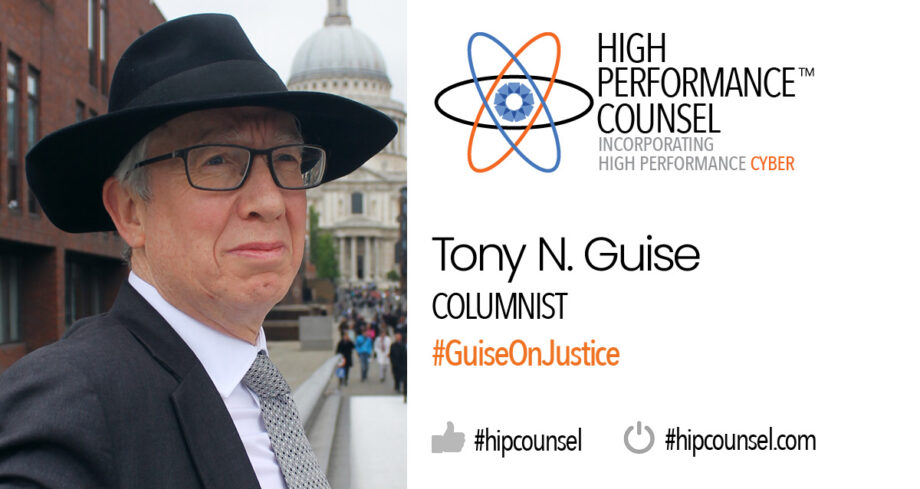As this is my first Christmas contribution for the #GuiseonJustice column it seemed appropriate to pick a Seasonal theme. What better than to offer a cracker – that staple of Christmas dinner tables. Sparkling they sit sentinel-like beside the dinner plates tempting with the enigma of what lies within!
Then with a crack and a bang they are pulled into pieces; their contents hurled into the Christmas tree, under the table and onto the left-overs. Yet such joy such ephemera bring! Simultaneously harmless and pointless: plastic puzzles, shiny rings once untied defy being united (Brexit?): fleeting but fun. Especially the riddles. Oh yes those riddles! Here’s my Cracker’s riddle, enjoy….

Let’s talk about Turkey. No, not that kind of turkey – Turkey the nation State in Eurasia. By Law 6325 of 2013 Turkey introduced voluntary mediation to civil law cases. In an uncomfortable application of the well-known idiom it’s an ill wind that blows no good: the arrest of thousands of Judges following the failed coup in Turkey during 2016 led to the introduction of mandatory mediation for Labour disputes under Labour Courts Law 7036 in force from 1 January 2018. During 2018 the process saw 67% of 297,147 cases settle and a 70% fall in the number of employment cases started in the Labour Courts compared with 2017. A remarkable win for mandatory mediation.
Of course there were objections the two principal objections being:
- ADR only works when the parties are invested in it, and choose to engage with it because it is right for the particular case at hand; and,
- Mandatory mediation creates an unacceptable infringement of the citizen’s right to a Court under Article 6 of the European Convention on Human Rights.
Each of those objections were taken seriously. As to the first, the objection is largely overcome by the frankly staggering success rate found in just the first year of operation. As to the second, as with the English and Welsh Court of Appeal (Lomax v Lomax [2019] EWCA Civ 1467), it was found that nothing prevents a citizen undertaking mediation, refusing to accept the possible settlement and continuing on to exercise the right to a Court under Article 6.
This trend was also evident in the spread of mandatory pre-litigation mediation through a number of Member States of the European Union such as Romania, Greece and Italy is also reflected and perhaps started by the decision of the European Court of Justice in Menini v Banco Popolare Società Cooperativa (C-75/16) handed down on 14 June 2017. Note the Backlogs in those countries is significant and in Greece is approximately 250,000 cases.
These trends are increasingly reflected in England and Wales’ Civil Justice system with such mandatory pre-litigation schemes already operating successfully in employment law, family law and in relation to disputes concerning Education and Health and Care (EHC) Plans for children with special educational needs. This approach would seem set for wider roll-out following a 2021 Civil Justice Council consultation on the reform of the Pre-Action Protocols (PAPS). This consultation includes amongst its Terms of Reference whether:
8. Are PAPs a mechanism for de facto compulsory ADR prior to commencement of litigation? Should they be?
10. Should there be any changes to PAPs as a result of the HMCTS reform programme and the digitisation of the civil justice system generally? To what extent are PAPs already online? Should there be further digitalisation of PAP steps and guidance?
Issue 10 is really interesting. The question of how far we can now automate the civil justice system is clearly exercising the minds of senior Judiciary. Especially following the failure to secure more funding for the Modernisation Programme to digitise the English and Welsh justice system in the Autumn 2020 Financial Review Again inspiration may be drawn from Turkey.
In Turkey in addition to setting up mandatory mediation also established that it would be managed online via a platform built by the Turkish Ministry of Justice. Plainly any further reform of the PAPs must include the management of the PAPs and any processes within those, such as ADR, online. We cannot look forward to that in England and Wales but since 2016 the DisputesEfiling.com Platform has a module for the steps required under each of the 16 PAPs.
This column understands that in England and Wales the Government is looking at rolling out more mandatory ADR funded by the State – you heard it first in the #GuiseonJustice column folks!
Elsewhere around the globe different considerations apply but all have resonance closer to home. The largest democracy in the world, India, has a huge Backlog of civil cases and in response to this introduced mandatory pre-institution mediation under the he Commercial Courts (Pre-Institution Mediation and Settlement) Rules, 2018.
The State of New York introduced presumptive mediation from June 2019 which was so successful that the State is now about to start funding mediators (hitherto a pro-bono activity on the part of the mediators) and is creating its own ADR management platform to cope with the volume.
In Nigeria the Backlog for the Federal Republic as a whole is ca 500,000 cases. In April 2019 the State of Lagos introduced the aptly named: Expeditious Disposal of Civil Cases Practice Direction (Backlog Elimination Programme (BEP)) and Pre Action Protocol. Which requires mandatory pre-institution ADR with costs sanctions for the Defendant who does not engage.
Next on this whirlwind tour of access to justice initiatives we call at Singapore where in June 2020 The Singapore International Dispute Resolution Academy (SIDRA) published a survey of lawyers and In House Counsels’ approach to arbitration and mediation.
The survey found! Of clients and lawyers using arbitration and mediation more clients (48%) rated the use of platforms for conducting ADR than lawyers (28%). For smart lawyers this indicates an opportunity to gain competitive advantage. The SIDRA Survey is here:
https://sidra.smu.edu.sg/sites/sidra.smu.edu.sg/files/survey/index.html#zoom=z
When talking about how ADR can bust backlogs we cannot overlook Brazil where a new, young diverse generation of Arbitrators are pushing their way into the market for expert Arbitrators against a background of further growth of international trade especially with the UK and the need for speedy resolution of disputes free of the Backlogs so present in both the Brazilian and English & Welsh civil justice systems. In the van of this new generation is Elis Wendpap once again recognised by Who’s Who Legal as a Future Leader in the field of arbitration in 2020. Elis is leading the way by specialising in providing arbitration expertise in the ever growing international trading routes between England and Wales and Brazil focusing on the international law and jurisdiction issues. Free of the older generation’s anxiety about using LegalTech this generation only want to work online for In House Counsel who also only want to work online.
This exciting new generation is hard at work across the globe and I pick out another great exponent in Karolina Jackowicz (https://kjadr.com/) who is already using the DisputesEfiling.com Platform to manage her mediation cases from Warsaw, Poland. Not for Karolina the need to persuade clients of the merit of working via an ADR management platform. Her clients are in the same 25-40 generation who only want to work online!
The times are certainly changing! It is a thrilling time to bear witness and help mould the future.
I hope you enjoyed this, my first contribution to the #GuiseonJustice column – see you in 2021!
Oh yes, the riddle: what cannot be seen but can be counted? Why – the Backlog of course! #bustthebacklog folks, have a great break wherever you are.

Tony qualified as a solicitor in 1986. In 2003 he founded his own firm, the first commercial litigation niche practice in the country.
A Past President, London Solicitors Litigation Association (2002-2004), Tony founded the Commercial Litigation Association and was its first Chairman (2007-2015). Member, Civil Justice Committee of the Law Society of England (2008-2016).
Tony has been deeply involved in the reform of the civil justice system in England and Wales for the past 26 years. In 2016 Tony turned his attention full time to the introduction of IT into civil justice and founded companies dedicated to this market.

ABOUT HIGH PERFORMANCE COUNSEL (HPC)
Founded by international lawyer and successful legal technology founder, David Kinnear, High Performance Counsel (HPC) is the leading business media resource covering the modern legal industry and the people, technology and economic forces driving its future. Described as the “voice of the modern legal industry” HPC provides world-class media coverage via one-to-one feature interviews with leading legal professionals and the publication of key insights via articles, white papers and industry commentary.
Visit us online here: https://HPC.law
Follow us on Twitter: https://twitter.com/HipCounsel
Connect with David Kinnear on LinkedIn: https://www.linkedin.com/in/davidkinnear/
Connect with HPC on LinkedIn: https://www.linkedin.com/company/hipcounsel
For more information, click here.

FURTHER INFORMATION / PRESS INQUIRIES:
High Performance Counsel ™ (HPC)
NY: +1 (917) 886-3222
London: +44 (07547) 128191
Website links:
HPC Global Summit: www.HPCGlobalSummit.com



Leave A Comment?